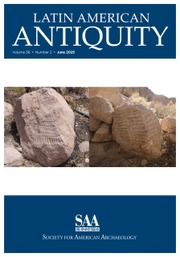Crossref Citations
This article has been cited by the following publications. This list is generated based on data provided by
Crossref.
Cadwallader, Lauren
Arce Torres, Susana
O'Connell, Tamsin C
Pullen, Alexander G
and
Beresford-Jones, David G
2015.
Dating the Dead: New Radiocarbon Dates from the Lower Ica Valley, South Coast Peru.
Radiocarbon,
Vol. 57,
Issue. 5,
p.
765.
Vaughn, Kevin J.
Conlee, Christina A.
Whalen, Verity
and
Van Gijseghem, Hendrik
2016.
Plazas and communal space in Nasca: changing patterns of public ritual through the Formative and Early Intermediate periods (800 B.C.– A.D. 650) on the south coast of Peru.
Ñawpa Pacha,
Vol. 36,
Issue. 2,
p.
111.
Carmichael, Patrick H.
2020.
Nasca Pottery Production: Retrospect and Prospect.
Ñawpa Pacha,
Vol. 40,
Issue. 2,
p.
133.
Lévy Contreras, Jessica G.
and
Wołoszyn, Janusz Z.
2020.
A Pyro-Engraved Gourd from Cahuachi: An Iconographic and Technical Analysis of a Nasca Masterpiece.
Ñawpa Pacha,
Vol. 40,
Issue. 1,
p.
21.
Marsh, Erik J
Korpisaari, Antti
Puerto Mundt, Sebastián
Gasco, Alejandra
and
Durán, Víctor
2021.
RADIOCARBON VS. LUMINESCENCE DATING OF ARCHAEOLOGICAL CERAMICS IN THE SOUTHERN ANDES: A REVIEW OF PAIRED DATES, BAYESIAN MODELS, AND A PILOT STUDY.
Radiocarbon,
Vol. 63,
Issue. 5,
p.
1471.
Contreras, Daniel A.
2022.
Stages, Periods, and Radiocarbon:14C Dating in the Archaeology of the Central Andes.
Ñawpa Pacha,
Vol. 42,
Issue. 2,
p.
205.
Sanjurjo-Sánchez, J.
Viveen, W.
and
Vega-Centeno Sara-Lafosse, R.
2022.
Testing the accuracy of OSL and pIR IRSL dating of young geoarchaeological sediments in coastal Peru.
Quaternary Geochronology,
Vol. 73,
Issue. ,
p.
101382.
Knobloch, Patricia J.
Glascock, Michael D.
and
MacDonald, Brandi L.
2023.
Picking up the pieces: Instrumental Neutron Activation Analysis (INAA) of early intermediate period and middle horizon pottery from Ayacucho, Peru.
Ñawpa Pacha,
Vol. 43,
Issue. 1,
p.
55.
Pacompia, Yolanda
Supo-Ramos, Justo G.
Gonzales-Lorenzo, Carlos D.
Callo-Escobar, Darwin J.
Rocca, René R.
Pastrana, Elizabeth C.
Gomes, Monise B.
Silva-Carrera, Betzabel N.
Watanabe, S.
Ayca-Gallegos, Oscar
and
Ayala-Arenas, Jorge S.
2023.
Luminescence dating and firing temperature determination of ancient ceramics fragments from the Tunata-hill site in the Churajon archaeological complex in Arequipa, Peru.
Radiation Physics and Chemistry,
Vol. 204,
Issue. ,
p.
110725.
Conlee, Christina A.
Contreras, Daniel A.
Peters, Ann H.
and
Vaughn, Kevin J.
2024.
Reconsidering chronologies and cultural change on the south coast of Peru: A compilation and analysis of radiocarbon dates from Nasca, Ica, and Paracas.
Quaternary International,
Vol. 703,
Issue. ,
p.
97.
Eerkens, Jelmer W.
Vaughn, Kevin J.
Linares-Grados, Moises
and
Beckham, Christopher
2024.
Long-Term Camelid Husbandry and Agricultural Intensification in the Southern Nasca Region, Peru: Insight from Faunal Isotopes.
Latin American Antiquity,
Vol. 35,
Issue. 3,
p.
694.
Gonzales-Lorenzo, Carlos D.
Pacompia, Yolanda
Cano, Nilo F.
Rocca, René R.
Chubaci, Jose F.D.
Sullasi, Henry S.L.
Vilca, Zaida V.
Ayca-Gallegos, Oscar
and
Ayala-Arenas, Jorge
2024.
Quartz OSL dating of ancient ceramics fragments from the Churajon archaeological complex in Arequipa, Peru.
Quaternary International,
Vol. 707,
Issue. ,
p.
38.


